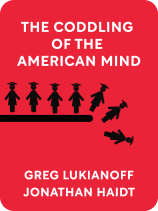

This article is an excerpt from the Shortform book guide to "The Coddling of the American Mind" by Greg Lukianoff and Jonathan Haidt. Shortform has the world's best summaries and analyses of books you should be reading.
Like this article? Sign up for a free trial here .
What are microaggressions? Why do authors Jonathan Haidt and Greg Lukianoff believe that excessive focus on perceived microaggressions can lead to a negative feedback loop?
In their book The Coddling of the American Mind, co-authors Jonathan Haidt and Greg Lukianoff say that the focus on microaggressions is unhealthy because oftentimes, the aggressive behavior is perceived when no intentional slight was actually made. The authors claim that many reactions to perceived insults are taken too far, especially when they lead to de-platforming.
Keep reading to learn what Jonathan Haidt and Greg Lukianoff have to say about the intent versus impact of microaggressions.
Microaggression and Misperception
Another dangerous manifestation of emotional reasoning can be seen in the phenomenon of so-called “microaggressions.”
Microaggressions are minor slights that members of minority groups are often exposed to in the course of daily life. A microaggression might occur when a white person instinctively crosses the street when they see a black person coming their way, or when a person of color is automatically assumed to be a member of the waitstaff at an office cocktail party.
These experiences can be deeply emotionally painful for those on the receiving end of them, particularly as they build up over time. This is why it’s important to be respectful and mindful of one’s potential cultural blind spots, particularly when in diverse company—as one often is on a college campus.
But an excessive focus on these incidents can cause the recipient to perceive an intentional slight where there was none. This sort of mind-reading is a classic symptom of negative-feedback loop thinking, wherein one assumes the very worst about people.
Undoubtedly, some microaggressions are intentionally hostile But often, another interpretation is available:
- When a white person says, “I think jobs should go to the most qualified person,” they are usually not saying “Systemic racism is a hoax that enables black people to receive unfair advantages in the job market.”
- When a white person says, “The US is great because it’s a melting pot,” they rarely mean to say, “Members of minority groups should abandon their culture and assimilate into ours.”
Believing that microaggressions indicate deep-seated and personal hostility encourages listeners to constantly take offense to the world around them.
Intent Versus Impact
Certainly, a diverse college campus presents no shortage of opportunities for offense-taking, if you choose to have such a defensive mindset. Inevitably, you are going to encounter people who come from different ethnic or socioeconomic backgrounds than your own. If you come to interpret every innocent misunderstanding as a deliberate expression of racism, sexism, homophobia, transphobia, xenophobia, or other form of prejudice, you will soon find yourself in a battered emotional state.
What may be most harmful about the inordinate focus on microaggressions (and the heavy-handed efforts by student groups and even some university administrators to curtail them) is their tendency to conflate intent versus impact. The term itself encourages this attitude—an act of “aggression,” by definition, cannot be accidental. Ultimately, a deep belief in the pervasiveness and power of microaggressions only encourages you to feel more marginalized and disempowered, as you’re forever at the mercy of omnipresent forces of oppression.
De-Platforming
When perceived aggression is taken further, it can lead to de-platforming. De-platforming occurs when controversial guest lecturers, speakers, or debaters who are invited to a university campus to discuss issues are unable to speak due to protests by student activist groups. These groups often stage attention-grabbing protests, boycotts, walkouts, or disruptive displays of heckling in order to intimidate the speaker or pressure the university to rescind the invitation.
Unfortunately, many of these student-led actions against speech have proven successful. This use of the “heckler’s veto” deprives others of the opportunity to hear the speaker, resulting in intellectual impoverishment for everyone. These de-platforming or disinvitation attempts stem from the same patterns of faulty thinking and emotional reasoning we’ve discussed so far—a belief that one’s safety is threatened by exposure to opinions with which one disagrees and an unhealthy focus on the oppressive power of microaggressions.
In the years since 2009 (and especially since the 2016 election), these efforts have become more common on the political left, usually targeting conservative speakers. While some of the speakers targeted by these protests have been right-wing provocateurs like Milo Yiannopoulos (whose goal is to provoke shock and outrage), many have been mainstream conservative commentators and policymakers.
In fact, many of the targeted speakers at universities are themselves left-leaning, including Clinton administration Secretary of State Madeline Albright and Obama administration Attorney General Eric Holder.
It is a cognitive distortion to believe that merely hearing ideas you disagree with causes you psychological harm. It is also deeply harmful to the process of learning and intellectual development. Learning is about forcing you to think. It is often meant to be uncomfortable, as it forces you to engage critically, be open to new information, and challenge long-held beliefs.

———End of Preview———
Like what you just read? Read the rest of the world's best book summary and analysis of Greg Lukianoff and Jonathan Haidt's "The Coddling of the American Mind" at Shortform .
Here's what you'll find in our full The Coddling of the American Mind summary :
- The "three Untruths" that have taken hold of young people
- The damage that "speech codes" cause on college campuses
- How colleges are increasingly seeing students as customers






